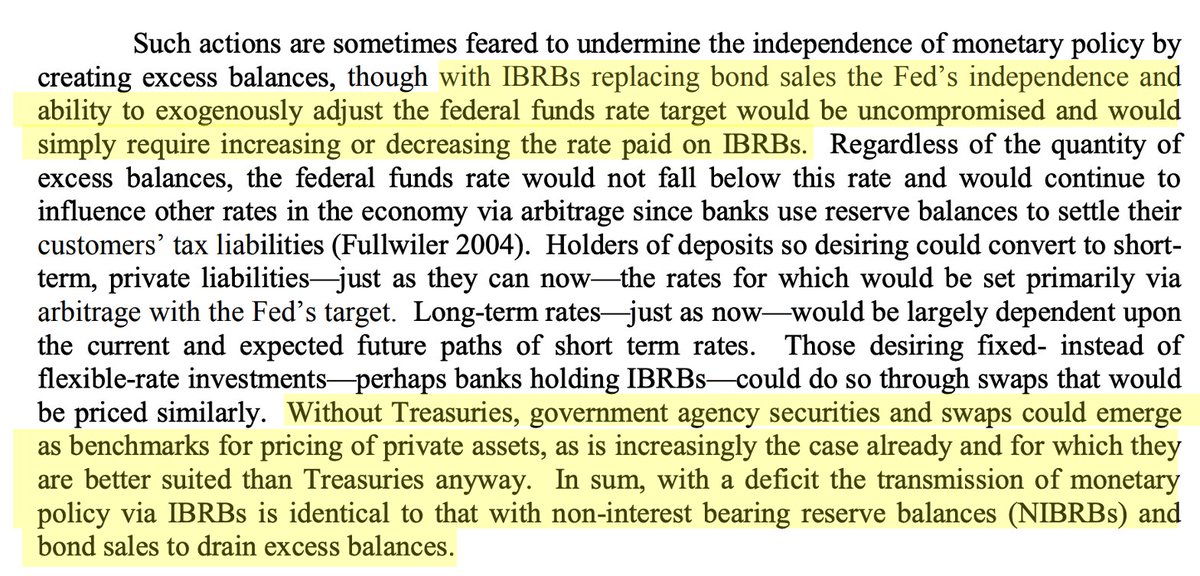The short answer is that the rest of us, on average, typically want to accumulate more US$ than what is required to pay taxes. That is, we want to net save US$. 2/
Government spending in excess of taxes--deficit spending--manufactures the $US that enable the rest of us to net save. 3/
Maybe you don't like the idea of government deficits. Maybe it feels irresponsible to see all of that "red ink" in the graph above. But ask yourself: Where would I rather see the deficits? 4/
If the goal is to sustain the expansion (with strong growth and high employment), there are basically two options: government deficits or private sector deficits. 5/
Here's James Galbraith: "To put things crudely, there are two ways to get the increase in total spending that we call 'economic growth.' One way is for government to spend. The other is for banks to lend. Leaving aside short-term adjustments like increased net exports or financial innovation, that’s basically all there is." 6/
"Governments and banks are the two entities with the power to create something from nothing. If total spending power is to grow, one or the other of these two great financial motors–public deficits or private loans–has to be in action." ~Galbraith 7/
This passage (from Galbraith) is key. Government deficits are necessary to prevent *private sector* balance sheets from deteriorating. 8/ 

Here is Fitch Ratings using the sector financial balances framework (with hints of Minsky) to make this point. "Most post-war US recessions have been preceded by deteriorating private-sector financial imbalances." 9/ fitchratings.com/research/sover…

Returning to Galbraith: "[T]he deficit phobia of Wall Street, the press, some economists and practically all politicians is one of the deepest dangers that we face. It’s not just the old and the sick who are threatened; we all are." 10/
If, as Fitch recognizes, government deficits are necessary to maintain healthy private sector balance sheets, then what explains the deficit phobia? 11/ 

"All of this should be painfully obvious, but it is deeply obscure...because legions of Wall Streeters–led notably in our time by Peter Peterson...and numerous 'bipartisan' enterprises like the Concord Coalition and the Committee for a Responsible Federal Budget–have labored mightily to confuse the issues." 12/

"We also hear, from the same people, about the impending 'bankruptcy' of SocSec, Medicare–even the U.S. itself. Or of the burden that public debts will 'impose on our grandchildren.' Or about 'unfunded liabilities' supposedly facing us all. All of this forms part of one of the great misinformation campaigns of all time." 13/
"It may seem like homely wisdom...to say that 'just like the family, the government can’t live beyond its means.' But it’s not. In these matters the public and private sectors differ on a very basic point. Your family needs income in order to pay its debts. Your government does not." 14/
There's a reason we refer to US Treasuries as "risk-free" assets. An *involuntary* default on repayment impossible. 16/ 

And, yes, we know about inflation risk, depreciation risk, the Greek debt crisis, and Argentina's debt default. We also understand what people tend to get wrong when they toss these examples around. /17 

Over the centuries, the government has added trillions to our balance sheets. That is a good thing. /18 

But what about interest payments? As followers of this account know, interest is a (regressive) federal subsidy. Every form of spending (private or public) carries inflation risk. But most public commentary about interest expenditure misses the point entirely. 19/ 

If you made it this far, thank you. We need a better informed electorate. Here's a link to Galbraith's article. There's quite a bit more that is important. end/ thenation.com/article/archiv…
• • •
Missing some Tweet in this thread? You can try to
force a refresh








